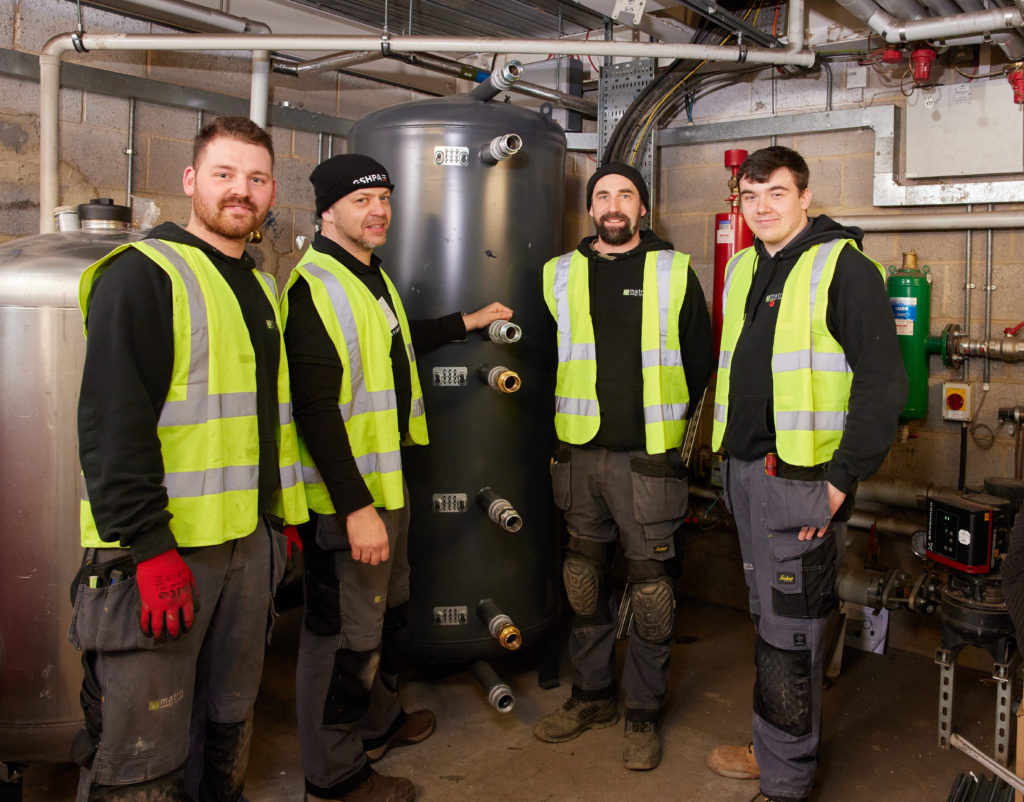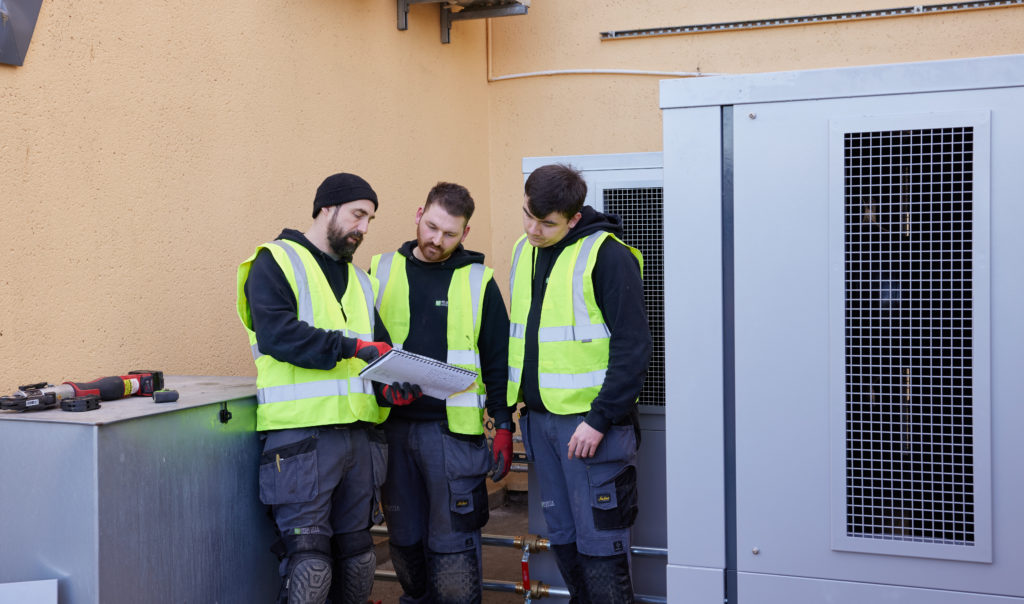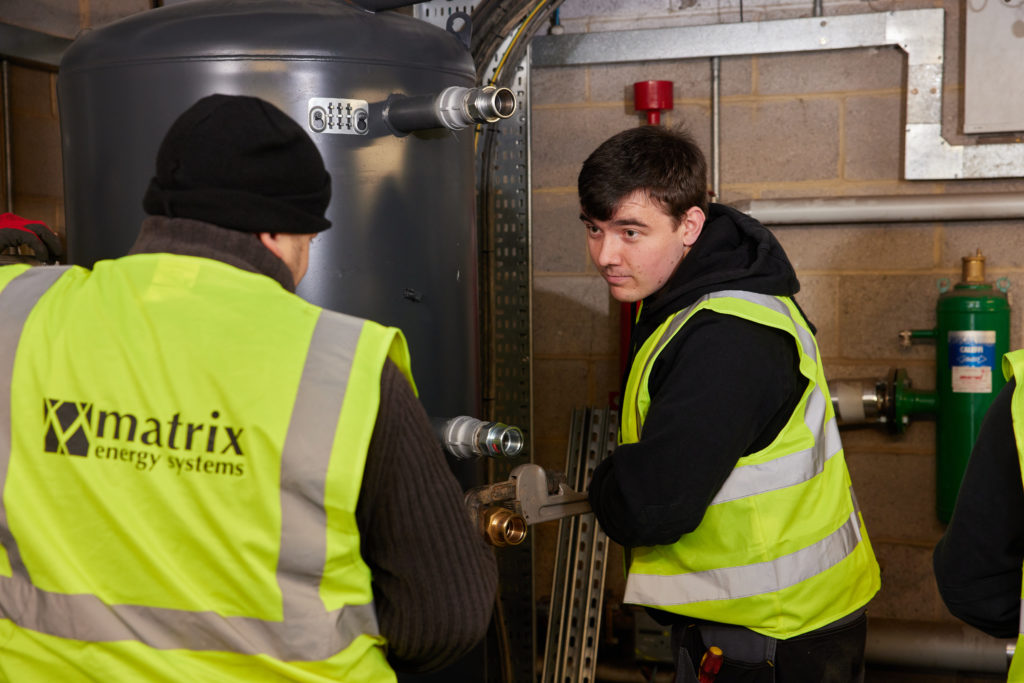National Apprenticeship Week: MCS installer champions apprenticeships
7 February 2022
National Apprenticeship Week 2022 is the 15th annual week-long celebration of apprenticeships, taking place from 7 – 13 February 2022.
Businesses and apprentices across the country will shine a light on the positive impact that apprenticeships make to individuals, the workforce, and the wider economy.
This year’s theme is Build the Future – looking at how apprenticeships can help to develop the future-ready skills needed for a rewarding career.
It’s a theme that resonates strongly with MCS. We are working closely with our renewables industry to define what skills and training pathways the sector needs to thrive.
This year we are supporting the launch of the UK’s first low-carbon heating technician apprenticeship. It is being designed in close collaboration with installers who do the work, reflecting real-world challenges that the industry face.
One such installer is Matrix Energy Systems, an MCS certified business established by managing director, Paul Leedham, in 2009. The Sheffield-based company now employs a full-time team and has built a successful business model by embracing the potential of apprenticeships.
Matrix has grown to become a leading provider of intelligent renewable heat and energy solutions in both the domestic and commercial markets. The company installs heat pumps (air- and ground-source), solar PV, solar thermal and biomass technologies across the UK.
Paul passionately advocates for training new talent. He has written nationally recognised training courses for heat pump installation and invests heavily in apprentices.
To celebrate National Apprenticeship Week, we joined the Matrix team on an air-source heat pump installation at RSPB Saltholme Nature Reserve. They told us all about their experience of apprenticeships and the value of on-the-job training:
Can you briefly tell us about your role at Matrix and what qualifications you have?

Chris Burton (CB), operations director: I finished full-time education with GCSEs and an advanced GNVQ in business. But at the age of 30 I decided to have a change of career and went to college to study NVQ level 2 in plumbing and heating. I joined Matrix Energy Systems and have been with the company for almost 10 years now. In that time, I’ve progressed from apprentice to my current position as operations director.
Lewis Pattinson (LP), senior engineer: I’ve been with Matrix Energy Systems for seven years and I am currently the senior engineer. Right from the start it was clear that I was stepping into a career. I’ve worked my way up from apprentice to technician to engineer and now my current role. As we expand, I hope to manage the engineering teams in another role.
I have all my relevant NVQ skills from college as well as further training on the renewable technology we install. Electrical qualifications and refrigeration training also complement my mechanical skills.
Harry Phillips, apprentice: My role at Matrix Energy Systems is low carbon apprentice technician and I support the activities of the installation teams. It varies who I work with depending on the job and I have experience in domestic and commercial environments installing heat pumps, solar PV, solar thermal and biomass technologies.
I currently have my Level 1 and 2 qualifications, and I am now working towards finishing my training to become fully qualified.
Why have you chosen a career in renewables?
HP: I’ve chosen a career in renewable technology because it is the future of the heating industry. We must be sensible about choosing the right way to heat our homes and businesses. By using renewable technologies, we are reducing the amount of carbon in the atmosphere. Plus, working at an MCS certified company gives me the opportunity to learn the best practices for installing all renewable technologies to approved standards.
LP: Matrix requested candidates from our college, and I immediately applied for an interview. I had a keen interest in renewable energy, but college didn’t really have the means to teach me more about it. So, an apprenticeship with an established company seemed like the best option.
CB: While studying my NVQ Level 2 at college a decade ago, I could see that the industry was about to make a long transition from fossil fuels to renewables. I had a desire to learn and be part of the some of the first installations of heat pumps in the UK.
Why did you choose to do an apprenticeship over other routes into the industry?
LP: I feel an apprenticeship is the only way to learn the core skills for a specific industry, directly from professionals who know the trade inside out. Plumbing and heating was my initial choice; but due to my interest in renewable energy, it made sense to go straight into a role with a company like Matrix Energy Systems.
HP: I chose to do an apprenticeship so I could have practical experience, develop a skill set and earn a wage at the same time. A renewable apprenticeship wasn’t available when I started. It is now, so I advise any new apprentices to take the opportunity if it interests them.
CB: I believe that an apprenticeship gives you the best opportunity to learn things the right way and can put you on the path to an exciting and rewarding career.

What advice would you give to young people or otherwise considering an apprenticeship
CB: To take it seriously and see it as the start of a long career and not just a job.
LP: Work hard and don’t always expect things to be easy. You must prove that you are capable and competent. But if you hold on to that attitude, there’s no looking back. The sky is the limit! I am the second youngest operative at Matrix, but also the most senior field operative. Age is no barrier.
HP: Choose a low carbon technician route if you want to work in the low carbon and renewable technology sector. As Paul says, this apprenticeship has been developed by the professionals in the industry, for the industry.
On top of my apprenticeship, I’ve learnt new skills from shadowing my team and developed life skills. I’ve become more confident with problem-solving and interacting with customers.
Do you think apprenticeships lead to long-term careers?
LP: It’s not just a job, it’s a career. Just look at Chris: after starting as an apprentice, he’s now our operations director.
HP: Definitely. Four of our team were apprentices: one is now operations director, one is a senior engineer, with the other two in technical operative roles. We work on air source heat pumps, ground source heat pumps and solar thermal. These are all renewable technologies that the new apprenticeship will focus on. I also have experience with electrical systems such as solar PV, battery storage and combined heat and power. The skills I’ve developed will be useful when I come to mentor the next apprentices at Matrix Energy Systems.
What do you enjoy most about working with heat pumps?
CB: The industry is currently in its infancy – there is constant change and improvement. We are at the forefront of these changes and improvements; there is no better place to be.
LP: I like to keep active and I’m always looking to further develop my knowledge. No two jobs are the same. I could be working on a small domestic air source heat pump one day and knee deep in a river installing equipment on a water source heat pump the next.
HP: I enjoy the installation of heat pumps because they are more unique compared to gas boilers. There are more components and accessories that need to be installed with heat pumps to make sure they work efficiently. I think this makes heat pumps more interesting to work with.
What more needs to be done to encourage more people into “green jobs”?

LP: We need more information and clear direction on what training is out there, where you can get it and where it can lead.
CB: I agree. Education and raising awareness around climate change and what impact current fossil fuel boilers have on our environment and planet.
HP: I think opportunities need to be regularly advertised and the colleges need to be promoting the green agenda more. Many colleges currently don’t offer careers in renewables, but I think this is soon to change. The options need to be clear for students, with a link into schools and careers advisors. There is a whole new world opening for students and it looks exciting.
This year’s theme for National Apprenticeship Week is Build the Future – what does this mean to you?
LP: I managed the build of a full ground source heat pump system on my own when I was 19, overseen by other staff. I would like to think that I have already started to build the future, a cleaner future. I want others to follow in my footsteps and see where this industry can lead. I have another 40 years of a career ahead of me and a lot will change in that time. I want to use my experience to shape this future and guide others to make the best possible choices they can.
CB: Renewable and sustainable energy are the technologies of the future. The industry is well placed to support this transition by employing or training the technicians of the future.
HP: For me it means I have an integral part to play in building the future, for not only our country but the world. We need to change the way we do things and embrace the new technologies and techniques that are available. To me, Build the Future means that we all have our own responsibilities to create the future we want. Hopefully everyone believes that building the future means making it greener and more efficient for all.
We’d like to thank Chris, Lewis, and Harry for sharing their apprentice journeys with us. For more on National Apprenticeship Week, look out for #NAW2022 and follow us on LinkedIn and Twitter.
